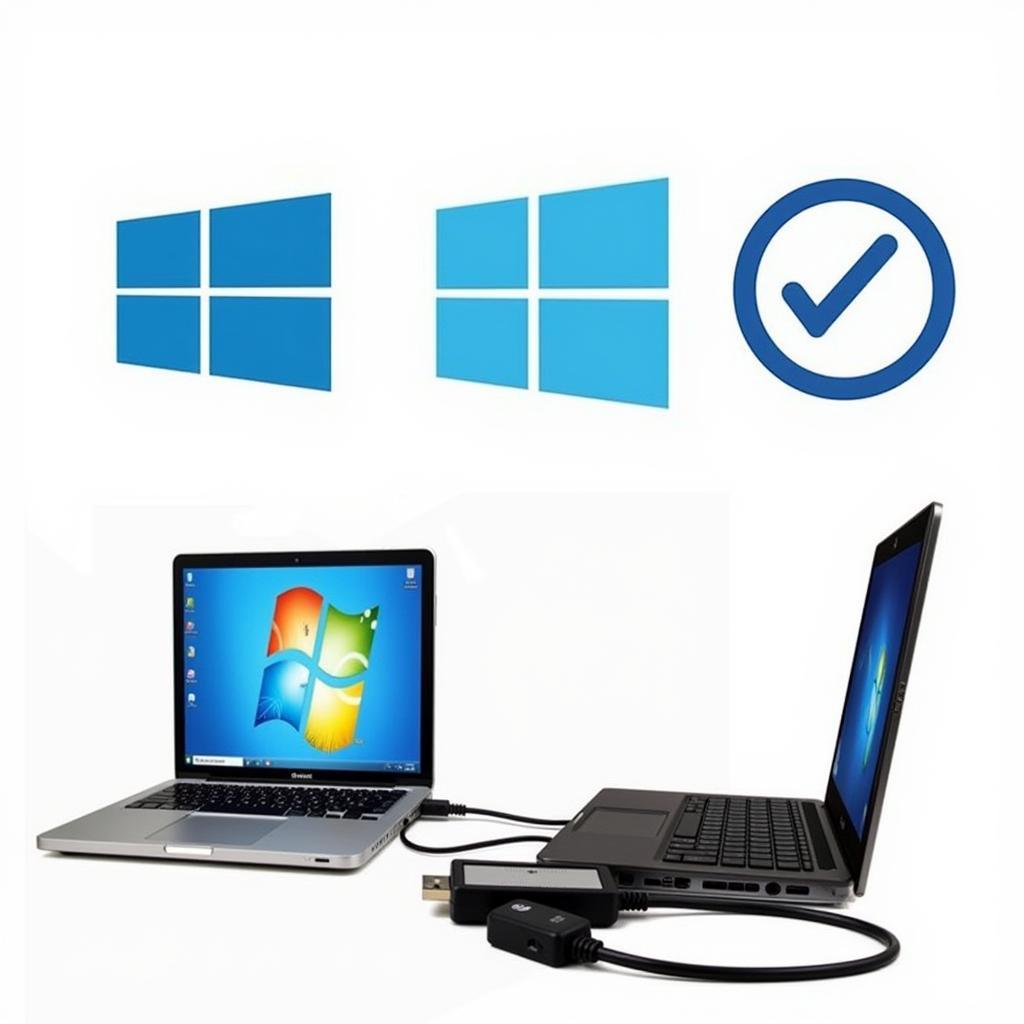Finding the right car diagnostic tool can feel like navigating a maze, especially for Windows users. With so many options flooding the market, it’s crucial to identify a tool that not only meets your needs but also delivers accurate results. Whether you’re a seasoned mechanic or a car enthusiast looking to demystify those pesky dashboard lights, this guide will equip you with the knowledge to choose The Best Windows Car Diagnostic Tool for your needs.
Why You Need a Car Diagnostic Tool
Before we delve into the specifics, let’s address the elephant in the room – why do you need a car diagnostic tool in the first place? Imagine this – your check engine light decides to throw a party on your dashboard right before a big road trip. Instead of panicking or shelling out a small fortune at a mechanic, a car diagnostic tool empowers you to:
- Identify problems early: Catch minor issues before they snowball into major (and expensive) repairs.
- Save money on diagnostics: Avoid those hefty diagnostic fees charged by mechanics.
- Gain a deeper understanding of your car: Become more car-savvy and confident in your ability to troubleshoot.
- Clear those pesky dashboard lights: No more driving around with that annoying check engine light staring you down.
Key Features to Consider
Now that you’re convinced of the benefits, let’s explore the key features that set apart the best Windows car diagnostic tools:
- Compatibility: Ensure the tool is compatible with your Windows operating system (Windows 10, 11, etc.) and your car’s make and model.
- Functionality: Determine what you need the tool for – reading and clearing basic codes, live data streaming, or advanced functions like programming and coding?
- User Interface: Opt for a tool with an intuitive and easy-to-navigate interface, especially if you’re new to car diagnostics.
- Connectivity: Choose between USB, Bluetooth, or Wi-Fi connectivity based on your preference and usage scenarios.
- Updates: Regular software updates are crucial to ensure compatibility with the latest vehicle models and diagnostic protocols.
- Support: Look for a tool backed by reliable customer support and a strong online community for troubleshooting assistance.
Top Considerations for Windows Users
Windows users have a unique set of considerations when choosing a car diagnostic tool:
Software Compatibility and Updates
Windows operating systems are infamous for their updates. Ensure the diagnostic tool you choose is compatible with your current Windows version and receives regular updates to maintain compatibility with future updates.
 Windows Compatibility for Car Diagnostic Tools
Windows Compatibility for Car Diagnostic Tools
Hardware Requirements
Some diagnostic tools may have specific hardware requirements like RAM, processor speed, or hard drive space. Verify your computer meets these requirements before purchasing a tool.
Security Concerns
Connecting a diagnostic tool to your car’s onboard computer involves a certain level of risk. Choose a reputable tool from a trusted manufacturer that prioritizes security measures to protect your vehicle and data.
Types of Windows Car Diagnostic Tools
Windows car diagnostic tools come in various shapes and sizes, catering to different needs and budgets:
- Code Readers: These entry-level tools primarily read and clear basic diagnostic trouble codes (DTCs) and are suitable for DIYers who want to understand and address simple car problems.
- OBD2 Scanners: A step up from code readers, OBD2 scanners offer more advanced functionalities, including live data streaming, freeze frame data, and emissions readiness checks.
- Professional-Grade Scanners: Designed for mechanics and experienced DIYers, these comprehensive tools offer advanced functionalities like programming, coding, bi-directional control, and access to manufacturer-specific systems.
Making the Right Choice
Choosing the best Windows car diagnostic tool boils down to your individual needs, budget, and technical expertise. Here’s a quick recap to help you make an informed decision:
- Define Your Needs: What do you want to achieve with the tool?
- Set a Budget: Determine how much you’re willing to spend.
- Read Reviews: Check out online reviews and comparisons to get real-user perspectives.
- Consider Future Needs: Will your needs evolve in the future? If so, opt for a tool with room for growth.
By following these steps and considering the factors discussed in this guide, you’ll be well on your way to choosing the best Windows car diagnostic tool to keep your vehicle running smoothly.
FAQs
Q: Can I use any car diagnostic tool with my Windows computer?
A: Not necessarily. Always check the tool’s compatibility with your Windows operating system version before purchasing.
Q: What’s the difference between an OBD2 scanner and a code reader?
A: While both tools can read and clear basic codes, OBD2 scanners offer more advanced functionalities like live data streaming and freeze frame data.
Q: Do I need a professional-grade scanner for DIY car maintenance?
A: Not unless you’re comfortable with advanced functionalities like programming and coding. For basic maintenance, a code reader or OBD2 scanner is usually sufficient.
Q: How often do I need to update my car diagnostic tool?
A: This varies depending on the tool and manufacturer. However, it’s generally recommended to check for updates regularly, ideally every few months, to ensure optimal performance and compatibility.
Need Help Finding the Perfect Diagnostic Tool?
Choosing the right car diagnostic tool can feel overwhelming, but it doesn’t have to be. Contact us via WhatsApp at +1(641)206-8880 or email us at [email protected]. Our team of experts is available 24/7 to answer your questions, provide personalized recommendations, and guide you through the selection process. We’re here to help you find the perfect tool to keep your car in top shape!

Leave a Reply